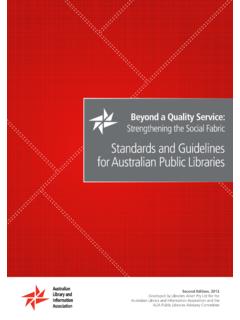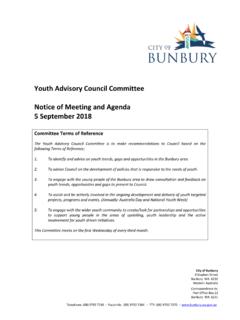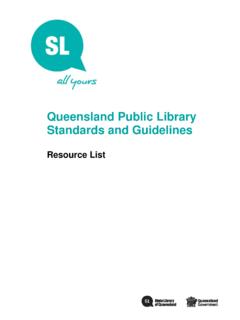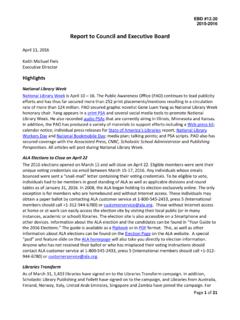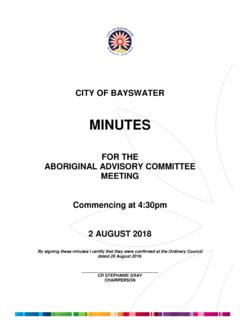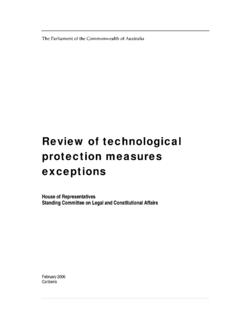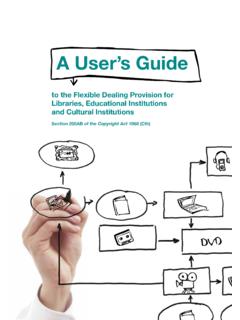Transcription of THE ROLE OF COMMITTEES OF MEMBERS IN PROVISION OF …
1 84 INSPEL 33(1999)2, pp. 84-95 THE ROLE OF COMMITTEES OF MEMBERS INPROVISION OF library AND information SERVICES*By Katalin HarasztiAbstract: Almost every type of library , national, university and school, public, private orspecial has some form of advisory Board or supervisory committee. This paper follows upinterest at recent IFLA meetings in the role of library COMMITTEES in relation to legislativelibraries. The results of some survey work on the prevalence of library COMMITTEES aresummarised and the subject is then considered in more detail in the context of a case studyof the library COMMITTEES of the Hungarian Parliament from 1867 until 1950 and theAdvisory Board established in "The ultimate responsibility for the policy, efficiency and management of a librarydoes not lie with the chief librarian.
2 Whatever the type of library there can hardlybe found a case in which the librarian is in complete control. Almost withoutexception the librarian is the servant of a higher authority; he may be verypowerful, with immense freedom to carry out the day to day management of alibrary, yet he is always acting as a professional executive who exercises his skilland expertise as the employee of his governing body ..It is the governing body of an institution which has the overall responsibility forits library PROVISION , and this body is always the holder of the purse body controls the financial resources given to the library has theultimate authority over it. Therefore although librarians manage or control, theydo not govern.
3 "1At the IFLA Conference held in Copenhagen in 1997 the question of the role ofLibrary COMMITTEES - or equivalents - attracted considerable interest. AnnaliseQuistorff, Head of the library of the Danish Parliament, distributed a paper2based on a questionnaire which the library of the Folketing had sent out with theassistance of the ECPRD3 to parliamentary libraries in Central, Eastern, and *Paper presented at the 64th IFLA General Conference August 16 - August 21, 1998 in Amsterdam1 Stockham, The Government and Control of Libraries, 2nd edition 1975, Deutsch, Quistorff, Annalise. The role of MEMBERS of Parliament in parliamentary library administration.
4 Paperat IFLA European Centre for Research and Documentation85 Western Europe and in the USA. This questionnaire sought information on theextent to which MEMBERS of Parliament (MPs) were involved in theadministration of the library or on other ways in which they followed the work ofthe library . Unfortunately the questionnaire did not reach the HungarianParliament, where there is both an old tradition of library COMMITTEES and greatinterest in the subject because of current developments. The author thereforedistributed an ad hoc questionnaire to those present at the Workshop of theSection on library and Research Services held in the Folketing. The ad hocsurvey asked which parliaments had a library Committee and some questions onthe status of the committee (standing, advisory , etc).
5 COMMITTEES around the WorldThe data derived from the Quistorff paper and the ad hoc survey (supplementedby some information gathered later from certain international assemblies) hasbeen analysed and is presented in the following diagrams. Responses wereavailable from 57 parliamentary assemblies, out of some 170 assemblies withparliamentary libraries. More than half of the responses came from Europe: adifferent picture might emerge if data was collected without this European Committee34% advisory Board33%Standing Committee33%Diagram 186 Standing or advisory No CommitteeDiagram 2 What do we learn from these figures? The first two diagrams show that theLibrary COMMITTEES are widely used; COMMITTEES or commissions are dealing withthe library from its strategy to its everyday activity in 32 of the 57 respondingparliaments.
6 The third diagram, an analysis by continent of parliaments withsome kind of library Committee or consultative board, shows that more than halfare European national 387Do we draw the conclusion that the library Committee is a European speciality?No, because the majority of parliaments who answered "yes" (18) to having astanding committee are from Australia, Asia and North America (11). Only sevenEuropean parliaments have a "standing library Committee", and there are fifteenEuropean national assemblies and one European international assembly with noparticipation by parliamentarians in library administration. In addition, weexamine the proportion of the continents where there are no library Committeesor MPs are not involved to the parliamentary library 's administration:AfricaAmericaAsiaAustrali aEuropeDiagram 4So perhaps the library Committee is not an European type library COMMITTEES are the most commonly used in the surveyedparliamentary libraries.
7 A "standing" library Committee means one whichgenerally consists of MPs, but sometimes chief officials from the administrativestaff are also elected or delegated. These standing COMMITTEES have regularobligations and their MEMBERS may have extra allowances. They may be workingin a more immediate framework than an advisory are the main functions of a library Committee or why should have it animportant role in the life of a parliamentary library ? In the cases analysed thesecommittees are: Policy making and oversight bodies, approving/providing strategic guidance and goals,88 deciding on the acquisition of documents, the lending service and rules ofaccess to the library for public or specialists and working and opening cases when the library Committee is an advisory board (communicative,supervisory, consultative, initiative etc.)
8 COMMITTEES ), these COMMITTEES alsoinclude MPs. Comparing with standing type COMMITTEES the main difference canbe found between their competencies. The advisory COMMITTEES generally haveonly supervisory competence, for instance reviewing the budget, being consultedon changes in information services, or working as an information channelbetween the factions (party groups) and the parliamentary these COMMITTEES also have regular obligations like the standing ones,their decisions are not obligatory. The committee MEMBERS are working as'volunteers' - generally not supported by any extra allowances. There are asignificant number of advisory type COMMITTEES in the surveyed European case might to be cited: the example of Germany where the Bundestaghas three COMMITTEES dealing with library matters (The Commission of theCouncil of Elders for Internal Affairs, a committee dealing with computerizationand one dealing with the move from Bonn to Berlin), while in the Bundesrat MPsare not involved in library first two diagrams show that about a third of the 57 responding parliamentarylibraries are administered without any formal participation of MPs.
9 Two Europeanexamples might be highlighted here because the present position is a changedone: in the Stortinget of Norway MPs have not been involved since 1992 in thelibrary administration because the previous supervisory board was abolished and"the parliamentary librarian [was made] responsible for presenting the library 'sbudget and new appointments. Likewise the Swiss .. parliament in 1988replaced the previous supervision by a Committee of Documentation into aCommission of Administration, the task of which is supervising the library budgetonly" Story of an Old-fashioned library Committee or the renaissance of atraditional modelThe traditional Hungarian model was based on the following three axioms:Axiom library Committee supervised directly the ParliamentaryLibrary 4 Quistorff loc cit89 Axiom library Committee had its own competenceAxiom library Committee held its meetings on regular basisThe first library Committee was established by the Parliament in 1867 in order tosupervise its library .
10 The committee MEMBERS were originally delegated by theSpeaker, but from 1875 they were freely elected when the new parliament set post-1875 library Committee was established as a standing committee. Thenumber of permanent MEMBERS varied: it worked optimally with 5-11 MPs, butsince the 1930's the participation rate had grown to 33 MEMBERS . After WorldWar II until abolition in 1950, the Committee had 17 MEMBERS . The LibraryCommittee had its own president or chairman: at first he was elected from itsmembers, later - probably as a consequence of its growing power and competence- the Speaker officially library Committee had the right to intervene in all matters of importance inthe library 's activity.
